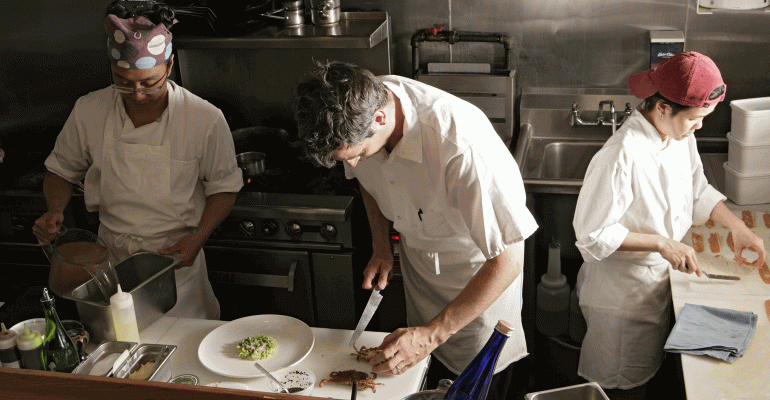Nancy Kruse, president of the Kruse Company, asks what’s driving the shift toward a people-centric restaurant business model.
A highlight of this year’s MUFSO conference, from my point of view, was the participation of Roy Choi, the groundbreaking Los-Angeles based chef who launched the seminal Kogi truck in 2007, from which he dished up Korean-inflected tacos and initiated the food-truck craze.

One of the things I most admire about him is his lack of pretense and utter approachability. I can’t think of anyone in the business —except maybe you, Bret — with whom I’d rather grab a beer.
Choi completely engaged the audience as he talked of his goal to use LocoL, his chef-driven, quick-service concept currently operating in economically depressed neighborhoods of Los Angeles and Oakland, Calif., to create jobs in other tough, inner-city locations of Detroit and Chicago.
In discussing his business philosophy, he stated that he views the bottom line as substantially less important than taking care of his employees, a statement that might have induced a bit of eyeball rolling had it come from someone else. But he’s a very persuasive advocate for his beliefs, and, given his impact and his track record, it would be a mistake to patronize him.
His comments were top of mind when I attended the Global Culinary Innovators Association’s annual chef confab that was held recently in Atlanta. It featured local luminaries like chefs Ford Fry and Hugh Acheson, who voiced similar sentiments.
Fry runs 11 highly successful restaurants, and he talked about the imperative of taking care of his people in return for all the hard work they do. He said he’s driven to create an environment in which they can learn and grow.
Acheson, who is a chef and partner in five restaurants, a contestant and judge on Bravo TV’s “Top Chef Masters,” and a James Beard award-winning cookbook author, declared that he’d feel he was a success if his tombstone read that he was a really good employer to his 300 workers and a good dad to his son.
None of these influential, high-profile operators spoke of an ambition to franchise, or suggested that having hundreds of units was the ultimate indicator of their achievements. Rather, they all espoused people-first principles.
Of course, lots of ambitious, talented restaurateurs continue to embrace franchising on a broad basis, and doing so certainly doesn’t rule out being employee-centric. We had confirmation of this from MUFSO’s Golden Chain winner Guillermo Perales, president and CEO of Sun Holdings Inc., one of the nation’s largest restaurant franchise businesses, whose scholarship program helps promote Hispanic leadership in an industry in which Hispanic employees are ubiquitous in restaurants, but largely missing in the C-suite.
And in 2015, hospitality titan Danny Meyer, CEO of the vaunted Union Square Hospitality Group and founder of the Shake Shack juggernaut, grabbed headlines with his plan to eliminate tipping in order to raise wages both in the front and back of the house at his 13 New York City restaurants. He followed up this year with an expansion of paid parental leave to all full-time employees after one year of service.
All of this dovetails with sentiments expressed by numerous speakers at last spring’s Worlds of Flavor program, where Parisian chef David Toutain said he closes his Michelin-starred restaurant on Saturday and Sunday because he wants to spend more time with his family. Seattle chef Renee Erickson talked about the lengths to which she goes in order to help her employees grow.
So what the heck is going on here, Bret? People-centric entrepreneurs have always been with us, as witness the late, great Norman Brinker. But it occurs to me that these sentiments are being voiced and these initiatives are occurring at a time when it’s extremely tough to hire and retain good restaurant employees, when the industry is beset by demands for higher wages and better benefits.
Is this all simply a response to the tough employment environment, or could there be some larger fundamental shift in values as members of Gen X and the Millennial generations assume restaurant leadership positions? Would you care to hazard a guess as to what this all portends for the future of the business?
Economic, cultural factors play a part
 NRN senior food editor Bret Thorn responds to Kruse Company president Nancy Kruse’s take on a people-centric restaurant business model.
NRN senior food editor Bret Thorn responds to Kruse Company president Nancy Kruse’s take on a people-centric restaurant business model.
Nancy, I think a big part of this new focus on being nice to employees is economic.
The current unemployment rate is about the lowest it’s been in a decade, making good staff staggeringly difficult to find. In fact, I’ve heard many stories of restaurants having to delay openings because they can’t find enough workers, and of restaurant groups holding job fairs at which hardly anyone shows up.
That means when restaurant operators find good employees, they work hard to keep them.
But I think there’s something else at play, too. Restaurateurs don’t go into the business for easy hours or fast bucks, and if they do, they soon learn that they’re in the wrong business.
There’s something innately nurturing about restaurant operators. After all, the word “restaurateur” is French for “one who restores.” Their job is to replenish people’s energy and make them happy.
As Roy Choi said at MUFSO: “It’s not like we’re totally balling all the time. We live to feed people.”
Until recently, the act of restoration was focused on customers. Front-of-house staff was basically contract laborers working for tips, except at quick-service restaurants where counter staff was hired inexpensively and either promoted quickly if they were talented, or used for what they were worth until they were fired or quit.
The back of the house was comprised largely of the dregs of society: ne’er-do-wells, ex-convicts and otherwise troubled people with few prospects and low aspirations. Restaurants gave many of those people a purpose, a certain sense of dignity, or, if nothing else, a way to make ends meet — and those workers didn’t ask for anything else.
Then the food revolution happened. It became cool to work in kitchens, at least in theory, and so the industry attracted a new set of people who wanted a profession rather than a trade. They didn’t want to be bullied or yelled at, and reacted badly to the fairly brutal conditions of working in a professional kitchen. As their expectations rose, so did interesting opportunities as talented chefs fanned out from the traditional great restaurant cities such as New York and San Francisco to other markets, creating new food cultures across the country.
Meanwhile, in the front of the house, service models started to change as more fast-casual restaurants opened, where customers aren’t expected to tip.
With no tips, but expectations for somewhat better service than at quick-service restaurants, I think it became clear that new models needed to be created to make competent staff happier. I don’t think that’s happened yet, but chains such as Chipotle Mexican Grill, Zoe’s Kitchen and Shake Shack have explored ways to provide better lives for their staff, in part with the hope that they’ll stay longer.
But beyond that, I think a cultural shift is underway. As you suggested, Nancy, a new generation of restaurateurs are taking the reins of leadership, who have come to realize that happy workers are better at making their customers happy.
That’s not necessarily a generational thing: Danny Meyer is a Baby Boomer who has long asserted that if he looks after his staff, they will look after his customers. Another Boomer, Jersey Mike’s CEO Peter Cancro, espouses the same line of thinking, and is actually working to open more company-owned restaurants so he can give equity in those restaurants to his office staff, because it seems like the right thing to do.
That’s happening in a social environment in which many consumers no longer accept the notion that “business is business.” In fact, they want to support companies that act responsibly in their communities and treat their employees well.
All of those factors contribute to a situation in which more operators don’t just think that being good to your staff is good business, but it’s also the right thing to do.
Nancy Kruse, president of the Kruse Company, is a menu trends analyst based in Atlanta and a regular contributor to Nation’s Restaurant News. E-mail her at [email protected].
Contact Bret Thorn at [email protected]
Follow him on Twitter: @foodwriterdiary





